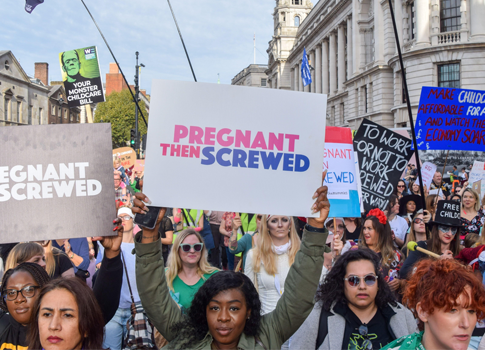There are many assumptions surrounding Gen Z that marketers take as fact. However, relying on these assumptions could negatively impact your results. The key to a successful campaign is truly understanding the people and groups within Gen Z and all their nuances. We cannot make sweeping generalisations about a whole generation, and instead need to identify the personalities or specific personas we want to reach. That’s why behavioural planning, which we specialise in here at Total Media, is so effective. We truly understand the individual, their behaviours, and how and where to reach them.
There are a range of myths about Gen Z that brands need to challenge when it comes to understanding their audience
I attended Channel 4’s introduction to their latest research, ‘Beyond Z’, where we explored a wide range of assumptions surrounding Gen Z. Some of the most common myths identified in the research are:
- There is a universal youth culture
- They are all ‘woke’
- They care about the environment
- They all have a side hustle
- They are in conflict with the older generation
However, there are approximately 10 million Gen Z’s in the UK, and these generalisations simply cannot be applied to all of them. Brands need to drill down into the individual groups and how they are shaped by their personal experience in order to build a better picture of their desired target audience.
There is no single Gen Z culture in the UK. Instead, our youth is shaped by the following:
- Intersectionality– In the simplest of terms, we are not just one thing or another. Our identity is a complex construct of lots of factors that impact us (both positively and negatively) in differing, and sometimes conflicting, ways. We do not fit into any single category and therefore cannot be grouped by marketers into one singular target audience. Instead, brands need to dive deeper into the other factors like race, geography and social-economic backgrounds in order to discover who their real target audience are.
- Inequality– There is currently a huge gap between the most and least privileged in society. This massively impacts the experience of young people in the UK. For example, two young people from the same generation could have a vastly different experience growing up based on their socio-demographic background, which will shape their consumption, disposable income and outlook. Therefore, both cannot be reached by marketers in the same way. Different messaging will resonate more with different people, which brands should take into consideration when planning campaigns.
- (Hyper) individualism– In today’s society there is a sense of greater freedom to express individuality and greater societal acceptance of differences, although of course more still needs to be done. However, this impacts the way that Gen Z views brands. You also need to be more accepting of individuality and actively displaying this support, but in an authentic way. People see right through marketing attempts that are not genuine, such as ‘green washing’ or using Pride Month only as brand opportunity and not real allyship, so you need to ensure your values are thoroughly integrated in your business in order to connect with Gen Z.
Why we need to rethink our approach to ‘Gen Z’
The biggest takeaway from Channel 4’s event was that Gen Z are widely misunderstood. As an industry we should make a conscious effort to do the following when thinking about ‘Gen Z’:
- Avoid ‘lazy generational thinking’ – There are a whole host of misconceptions that we rely upon when regarding certain audiences. However, using these stereotypes as the basis for media planning will largely hinder us. There are a lot of other factors that are more impactful on our outlook, consumption, interests and beliefs than our generation. Factors such as geography and socio-economic status are far more important considerations when it comes to understanding your target audience. Deep diving into these factors, and subsequently planning around them, could be the difference between your campaign success and your competitors.
- Recognise that the difference between generations are radically overstated – People don’t change hugely overnight – it is an evolution. On the whole, thoughts and behaviours simply increase or decrease over time, and marketers need to target these behaviours during their point of change in order to have an impact. We also still hold a lot of the same needs and aspirations as we grow older. Channel 4’s research showed that when looking at belief statements used by TGI, a shared outlook between Gen Z and older generations was held roughly 70% of the time, versus 30% where beliefs were different. Therefore, the oldest and youngest in our society have much more in common than we first may think and shouldn’t be disregarded by brands as completely different audiences.
- Understand that some things about being young never change – Often marketers get too caught up in trying to understand the younger generation that they forget they were once young themselves. Although trends may change, there are a few things that always stay the same. The challenges around development, fear of uncertainty, huge life changes and societal pressure are all things young people experience no matter what the generation. Understanding these constants will help you gain a greater picture of the demographic you are trying to target without needing to worry about how different today’s youth are to when you were young. In the end, we all share the same human experiences, and tapping into these shared experiences can help you to understand your audience better.
Summary: When targeting ‘Gen Z’ you must delve deeper to find your ‘true audience’
My key insight from this research is that when approaching briefs with a ‘Gen-Z target’, we must delve deeper to find our true audience. There are far more nuances at play than simply the generational category, which means you cannot plan a successful campaign if you generalise a whole group of people based on the year they were born. Instead, you need to go much deeper to understand the individual and discover who you are really trying to reach in your campaigns. At Total Media, we specialise in behavioural planning, and have a range of tools that allow us to uncover your ‘true audience’ and how to effectively target them.
For more information on how we can help you to better understand your audience, contact us today.






